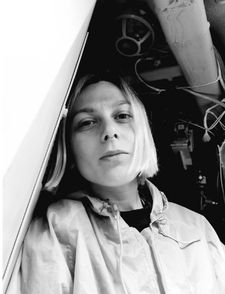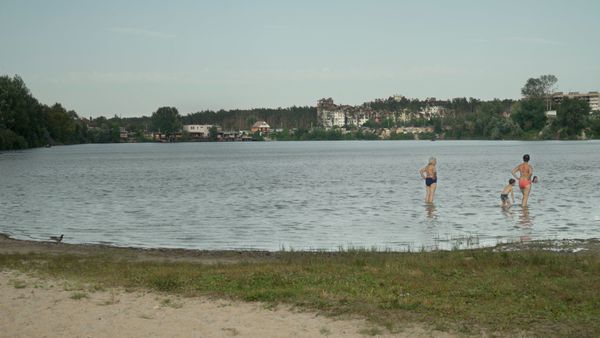The experience of life in Ukraine since the Russian invasion and the attitude of the Russian aggressors is brought sharply home by Oksana Karpovych’s stark documentary Intercepted. The locked off camera gazes at scene after scene - mainly domestic and showing evidence of lives left behind and Russian attack - as we hear phone calls made by Russian soldiers to their loved ones back home, intercepted by the Ukrainian authorities. The conversations are, for the most part, chillingly revealing of the soldiers’ opinions and prejudices, as well as their often horrific tactics. The film also captures the everyday resistance of Ukrainians in the face of the onslaught.
 |
| Oksana Karpovych: 'I made this film because I was feeling deeply that it's not just Putin’s war' |
“We shot basically as a kind of road movie. We moved across Ukraine. We started in the Kyiv region and then we moved towards the east and south. The shoot was divided into a few blocks and most of it happened in the summer and fall of 2022, with some things shot in 2023. We were quite close to the frontline. In some of the places you see in the film we were seven kilometres (less than five miles) from the frontline.”
Karpovych, who is from the Kyiv suburbs, explains that when the invasion happened she was living in Ukraine. In fact, on February 23, she was in Kramatorsk, in the Donetsk region, and was working as a local producer helping international reporters and was with a group of Finnish journalists at the time.
She explained: “Together with the journalists I moved and made the long journey to the south of Ukraine to a safer place. Eventually, those journalists on the left Ukraine, I helped them to evacuate. But I took the decision to stay because I knew that what was happening was a historical event, it was extremely important. I really wanted to witness what was going to happen. Eventually, I returned to Ukraine and soon after I started working as a local producer with Al Jazeera English reporters.
“I worked with them for six weeks and in the beginning of the invasion, I found myself speechless, or since I'm a visual artist, and a filmmaker, I can also say, imageless, I felt I was not capable of creating a single image to express the horror that I was witnessing. Eventually, after I finished working with the reporters, I came up with the idea of this film.”
The director said it was while she was working as a producer that she discovered the intercepted phone calls online, which the Ukrainian security services were releasing almost every day.
She said: “There were two parallel processes. On the one hand, I was living in the country in a war, witnessing multiple crimes committed by the Russian army. On the other hand, I was listening to this audio almost every day - I developed the habit of listening to this material. And basically, those two experiences gave me an idea for this film, which was a combination of two parallel realities.”
The material that is used in the documentary is all available online and dates from the beginning of the Russian invasion.
Karpovych said: “I listened to approximately 31 hours of these conversations, around 940 unique conversations that were published online. At the very end of the editing process, we received some exclusive material from Ukraine’s security services and some of it ended up in the film.”
She said: “I had tons of questions when I started and it was a very difficult process of listening to this audio as you can imagine and selecting it. But I was trying to be open minded. And I think one of my biggest questions about this material was to find some hope.
“What I was seeing in Ukraine was truly horrible and I thought maybe I would find some hope, maybe I would hear people who are empathetic, who regret what they are doing. Unfortunately, I didn't see much of that in this material except perhaps this one woman who I included. In the editing process, we kept calling her ‘critical woman’, because she is critical and she was the only one who was really seeing and telling the truth.
“On the one hand, I wanted to know why the Russians are doing this, what were the maybe private reasons of these people who were in Ukraine, invading it. On the other hand, the resistance is something that I saw from the very first day of the invasion. I’d never seen anything like that. It was really extraordinary, until today. And that resistance is often expressed in very subtle gestures. Sometimes it's just about maintaining the normality of your life, maintaining your home, keeping your space clean, that's a form of resistance for me, and I could see that everywhere we went in Ukraine. And the closer you were to the frontline, the more it was evident.”
In addition to the domestic spaces that become the subject of Karpovych’s film, a camera is also seen moving around the landscape, as though mounted on a tank.
The director said: “From the very beginning, I realised how the war affected the Ukrainian landscape and how a beautiful and vast country - it’s the biggest country in Europe - became this alienating, disordered space. And how things that were so clear and so solid, all of a sudden became mixed and confused and lost. And that was the idea of focusing more on the space and landscape. And showing what is that like for humans in that landscape.”
As with many Ukrainian directors, Karpovych finds the future tricky to talk about.
“We are in a very difficult situation,” she said, “And we're dealing with an extremely cruel and powerful enemy in Ukraine. And my personal vision of the future is pretty dark at the moment. And I think it really depends on the collective effort. I think that the resistance in Ukraine is very powerful, but it's really not enough. I think that we all are taking part in what is happening today. I think that what is happening in western politics, affects so much the destiny of Ukraine as well.
“I made this film because I was feeling deeply that it's not just Putin’s war. I wanted to challenge this myth that is very present in the West that it’s Putin’s war and to bring your attention to what common Russians do. I think they also bear responsibility for their actions and I really hope that the outcome of what is happening today would be not just the end of fighting, but justice, and the people who are committing these horrible crimes will be in court and be held responsible for what they did.”






















